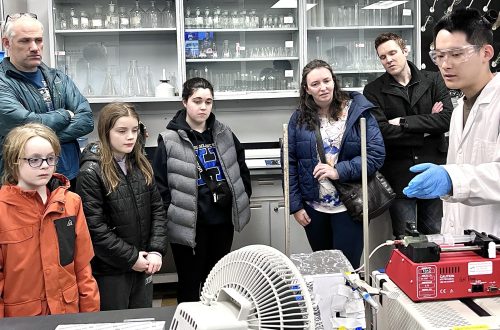Yellowknife, early to mid-April: A dedicated research team has embarked on a critical mission to collect a wide range of water samples in Yellowknife Town, intending to investigate the presence and potential consequences of Polybrominated Diphenyl Ethers (PBDEs) in the local environment. PBDEs, widely used as flame retardants, can be found in various products, including paints, plastics, foam furniture padding, textiles, rugs, curtains, televisions, building materials, airplanes, and automobiles, posing potential risks to human health and the ecosystem.

Led by the esteemed researcher Dr. Bing Chen, a professor at the Memorial University of Newfoundland and Director of NRPOP Lab, the research expedition seeks to assess the extent of PBDEs’ contamination in the water sources surrounding the town. This comprehensive study holds the key to gaining valuable insights into the scale and impact of PBDEs, ultimately enabling the development of effective mitigation strategies.
Equipped with state-of-the-art equipment and operated by specialized expertise, the research team will meticulously collect water samples from multiple locations, encompassing surface water and soil, within and around Yellowknife Town. These samples will then undergo rigorous laboratory analysis to determine the presence and concentration of PBDEs, enabling a comprehensive evaluation of their potential environmental impact.
Dr. Xing Song, a researcher at NRPOP Lab, emphasizes the significance of this study in comprehending the local environmental conditions and ensuring public health and safety. “Through our analysis of PBDEs’ concentration in Yellowknife’s water sources, we aim to identify potential sources of contamination and raise awareness regarding the need for effective measures to mitigate any adverse effects,” he says.

The research team intends to collaborate closely with local authorities and environmental agencies to ensure a concerted effort to address this issue. By sharing their findings and providing recommendations, the team contributes to developing sustainable strategies and regulations that minimize PBDEs, safeguarding the community’s well-being.
This study represents a momentous stride toward advancing environmental stewardship and fostering a safer, healthier future for the citizens of Yellowknife. The unwavering dedication and commitment of the research team to scientific exploration will undoubtedly shed light on the far-reaching impacts of PBDEs and pave the way for informed decisions about environmental conservation.



